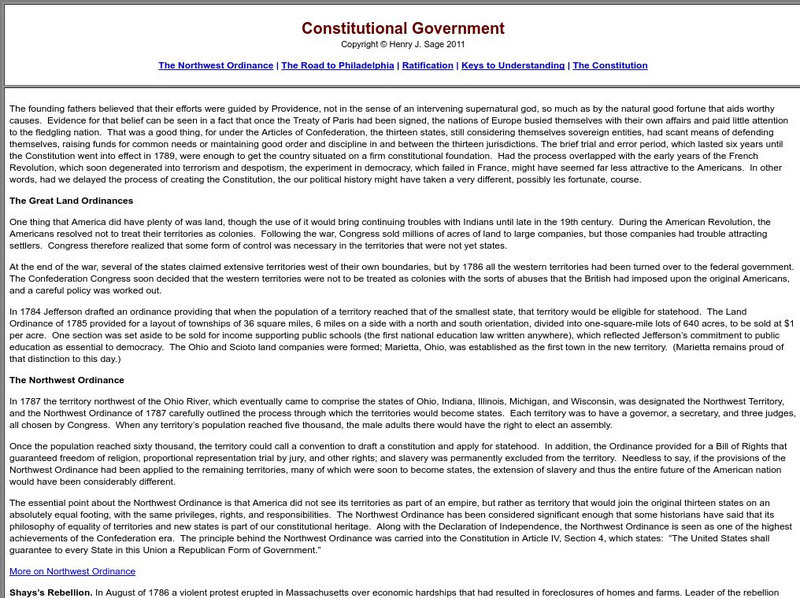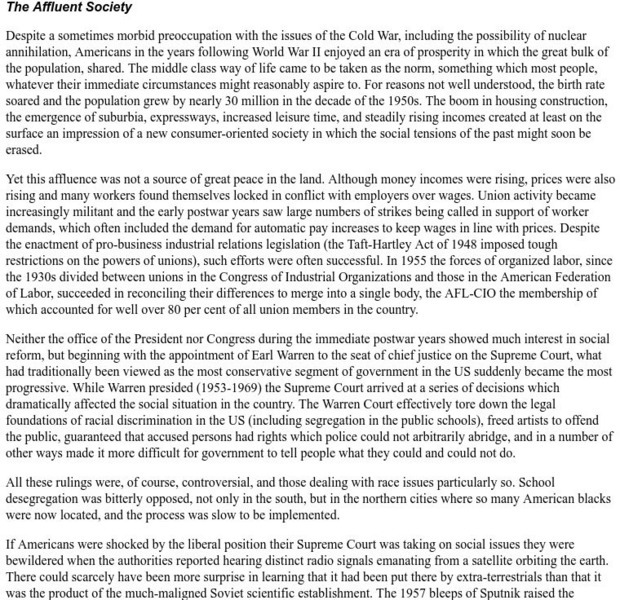Hi, what do you want to do?
Read Works
Read Works: The History and Process of Voting
[Free Registration/Login Required] This passage focuses on the American federal voting process including its history and how the process works. It is followed by a comprehension question set.
Henry J. Sage
Sage American History: Constitutional Government
Article outlining the events which ultimately led to the development and ratification of the U.S. Constitution. The author explains the components of the Constitution and how those pieces were debated and agreed upon.
US Department of State
U.s. Dept. Of State: u.s. Relations With Honduras
Read the State Department's perspective on the relationship between the Honduran and American governments. (February 2019)
US Department of Labor
U.s. Department of Labor: The Coal Strike of 1902: Turning Point in u.s. Policy
Read about the background of coal miners and coal mine operators prior to the coal strike in 1902. Find out the significant role of the federal government in bringing the strike to an end.
US Department of Labor
U.s. Department of Labor: The Federal Government and Negro Workers Under Wilson
This scholarly paper investigates the treatment of the federal government, sometimes ambivalent, sometimes hostile, during the presidential terms of Woodrow Wilson. See how Wilson's need for industrial workers and soldiers in the time...
A&E Television
History.com: How the u.s. Constitution Has Changed and Expanded Since 1787
Through amendments and legal rulings, the Constitution has transformed in some critical ways. The U.S. Constitution, written in 1787 and ratified by nine of the original 13 states a year later, is the world's longest-surviving written...
Constitutional Rights Foundation
Constitutional Rights Foundation: The Constitution and Slavery
Article and questions for discussion on the controveries surrounding slavery while writing the U.S. Constitution and forming a new U.S. government.
A&E Television
History.com: Mary Surratt Is First Woman Executed by u.s. Federal Government
Learn about Mary Surratt, her role as the conspirator in Abraham Lincoln's assassination and her fate. The site contain more than usual advertisements.
A&E Television
History.com: Has a u.s. Supreme Court Justice Ever Been Impeached?
Supreme Court justices serve for life, unless they resign, die or are impeached and removed from office. The reason for their lifetime tenure is to enable them to make decisions free from any pressure by the executive or legislative...
A&E Television
History.com: How Interstate Highways Gutted Communities and Reinforced Segregation
America's interstate highway system cut through the heart of dozens of urban neighborhoods. Congress approved the Federal-Aid Highway Act of 1956, authorizing what was then the largest public works program in U.S. history. It promised to...
A&E Television
History.com: When the Supreme Court Ruled a Vaccine Could Be Mandatory
In 1901 a deadly smallpox epidemic tore through the Northeast, prompting the Boston and Cambridge boards of health to order the vaccination of all residents. But some refused to get the shot, claiming the vaccine order violated their...
Immigration and Ethnic History Society
Iehs: Mark Overmyer Velazquez, "From Repatriation to Deportation Nation"
This article focuses on the history of the relationship between the US and Mexico regarding immigration. In the 1930s, the U.S. government forced hundreds of thousands of ethnic Mexicans, including some U.S. citizens, back across the...
A&E Television
History.com: Continental Congress
From 1774 to 1789, the Continental Congress served as the government of the 13 American colonies and later the United States. The First Continental Congress, which was comprised of delegates from the colonies, met in 1774 in reaction to...
A&E Television
History.com: Native Americans Weren't Guaranteed the Right to Vote in Every State Until 1962
Native people won citizenship in 1924, but the struggle for voting rights stretched on much longer. Native Americans couldn't be U.S. citizens when the country ratified its Constitution in 1788, and wouldn't win the right to be for 136...
A&E Television
History.com: Minimum Wage in America: A Timeline
Since 1938, the U.S. federal government has established that workers are entitled to a base hourly wage. Which workers receive that minimum -- and how much -- has remained a political issue.
A&E Television
History.com: How Aids Activists Used "Die Ins" to Demand Attention to the Growing Epidemic
As the AIDS crisis took hold in the 1980s, killing thousands of Americans and ravaging gay communities, the deadly epidemic went unaddressed by U.S. public health agencies -- and unacknowledged by President Ronald Reagan -- for years. In...
Other
Victoriana Magazine: Native American Tribes and u.s Government
The U.S. government's policies towards Native Americans in the second half of the nineteenth century were influenced by the desire to expand westward into territories occupied by these Native American tribes. By the 1850s nearly all...
University of Toronto (Canada)
University of Toronto: The Affluent Society
This site from the University of Toronto is a well-organized site that chronicles U.S. history. Good discussion of the effect of government spending on the economy during the Kennedy administration.
US Department of State
Us Department of State: Archive: Hungary
Provides information on the Republic of Hungary's geography, people, government, economy, history, national security, foreign relations, and U.S.-Hungarian relations. (January 2012)
Oklahoma Historical Society
Oklahoma Historical Society: Chickasaw
The history of the Chickasaw Nation in Oklahoma began in 1818 when tribal leaders signed the Treaty of Old Town, ceding their lands in western Kentucky and Tennessee. Years of negotiations with the U.S. government led to failure to...














